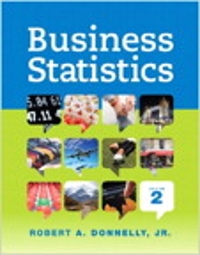Question
31. Complex and ambiguous rules in resource allocation decisions cause employees affected by those decisions: A: to disown their Machiavellian values B: to engage in
31. Complex and ambiguous rules in resource allocation decisions cause employees affected by those
decisions:
A: to disown their Machiavellian values
B: to engage in more organisational politics
C: to disband their politically motivated networks
D: none of the above
32. The two main forms of conflict within organizations are:
A: manifest and hidden
B: task-related and socioemotional
C: pooled and sequential
D: collaborating and competing
33. Salespeople at Widget Pty Ltd complain that they lose sales bonuses when the production
department is out of stock of a particular item. This sometimes causes customers to buy
elsewhere rather than wait for the next production run. Meanwhile, production employees
complain that salespeople don't appreciate the need to minimise inventory costs, for which
production staff are rewarded. This is mainly an example of conflict due to:
A: ambiguity
B: communication problems
C: pooled task interdependence
D: goal incompatibility
34. Which of the following most likely produces the highest risk of conflict?
A: Ambiguous rules and low task interdependence.
B: Precise rules and resource scarcity.
C: Plentiful resources and high goal compatibility.
D: Scarce resources and high task interdependence.
35. The collaborating interpersonal style of conflict has:
A: high assertiveness and low cooperativeness
B: high assertiveness and high cooperativeness
C: low assertiveness and high cooperativeness
D: low assertiveness and low cooperativeness
36. The accommodating conflict management style should be used:
A: never.
B: when the issue is much less important to you than to the other party.
C: when the other party has much less power than you do.
D: under conditions of both 'B' and 'C'.
37. Which of the following best summarises research on the competency (trait) perspective of
leadership?
A: Effective leaders tend to have a few common values and abilities, such as drive, intelligence
and integrity.
B: Competencies have no importance in identifying effective leaders.
C: Leadership scholars have identified at least two dozen competencies that are clearly related to
effective leadership.
D: The competency perspective of leadership has evolved into a sophisticated contingency-
oriented model.
38. Which of the following statements about path-goal theory is CORRECT?
A: Path-goal theory considers seven different leadership competencies.
B: Path-goal theory is based on the idea that leadership is a stable personality trait, so it is easier
to change the situation to match the person's leadership style.
C: Path-goal theory considers the subordinate's ability and experience when determining the best
leadership style for the situation.
D: Path-goal theory assumes that managers can apply only one leadership style in a given
situation.
39. Which leadership theory explicitly argues that people have a preferred leadership style based on
their personality, so organisations should move leaders into situations that fit their preferred
style?
A: Path-goal theory.
B: Transformational leadership.
C: Romance perspective of leadership.
D: Fiedler's contingency model of leadership.
40. Which of the following is a limitation of the transformational perspective of leadership?
A: It focuses too much on how leaders improve organisational efficiency.
B: It is typically presented as a universal rather than contingency perspective.
C: Researchers tend to define transformational leaders in terms of their success, rather than by
whether they engage in specific behaviours.
D: Both 'B' and 'C' are limitations of the transformational perspective.
41. Attributions are a major component of which of these leadership perspectives?
A: Trait perspective.
B: Romance perspective.
C: Contingency perspective.
D: Transformational perspective.
42. Self-efficacy refers to a person's:
A: tendency to reward him or herself (such as taking a break from work) before deserving the
reward.
B: tendency to avoid negative feedback.
C: belief that he or she has the ability, motivation and resources to finish a task successfully.
D: tendency to learn through classroom lectures rather than observation and experience.
43. Behavioural modelling and self-reinforcement are components of:
A: behaviour modification
B: tacit knowledge
C: social cognitive theory
D: the MARS model of individual behaviour and performance
44. ABC Corp. pays its employees a fixed salary in a pay cheque received once every two weeks.
This is an example of which type of consequence for behaviour?
A: Continuous reinforcement
B: Positive reinforcement
C: Negative reinforcement
D: Extinction
45. A British food company reduced absenteeism by giving employees with perfect attendance each
month two chances (through a lottery) to win $500. This is an example of:
A: tacit knowledge
B: behaviour modification
C: social learning
D: social loafing
Step by Step Solution
There are 3 Steps involved in it
Step: 1

Get Instant Access to Expert-Tailored Solutions
See step-by-step solutions with expert insights and AI powered tools for academic success
Step: 2

Step: 3

Ace Your Homework with AI
Get the answers you need in no time with our AI-driven, step-by-step assistance
Get Started


